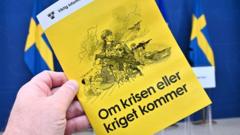As tensions in Europe escalate, the Nordic nations of Sweden, Finland, and Norway are rolling out updated civil defense guidance aimed at preparing their populations for possible crises, including war. In Sweden, the government is distributing a revised pamphlet titled "If the crisis or war comes," which expands on self-preparation measures and updates information from a 2017 version. This effort is in direct response to heightened threats perceived after Russia's full-scale invasion of Ukraine, according to Stockholm officials.
Sweden's updated pamphlet will be sent to millions of households starting Monday. The length of the document has doubled, reflecting a significant focus on military conflict and civil readiness. Essential messages, such as Sweden's stance of never surrendering to foreign aggression, have been emphasized more prominently in the material, reaffirming strong national defense commitments. Civil Defence Minister Carl-Oskar Bohlin indicated that the changing global landscape necessitates updated guidance for the public, especially in light of recent warnings about potential conflict on Swedish soil.
Finland has also issued new advice on preparing for various crises, opting for a digital format to reduce costs while maintaining measurability. Its digital brochure details governmental responses to armed attacks and advises without overwhelming households with print. Notably, Finland encourages residents to mentally and physically prepare for contingencies, particularly given its shared border with Russia and historical experiences of warfare.
Norway is distributing pamphlets urging citizens to prepare for at least a week's self-sufficiency in the event of crises, including severe weather events or wartime. Authorities there have cited the growing risks associated with climate change and increased natural disasters in their readiness campaigns. This year's outreach is more comprehensive, having learned from past experiences and updating checklists of necessities like canned goods, iodine tablets, and medicinal supplies.
These proactive measures reflect a broader cultural shift in the Nordic countries, transitioning from traditional neutrality to an increased emphasis on self-defense strategies. While Finland has long maintained extensive preparation protocols, Finland's war studies experts suggest that Sweden needed significant changes in public perception regarding national defense, a process accelerated by the current geopolitical climate.
As citizens ponder these new realities, diverse responses emerge. Some, like Swedish economist Ingemar Gustafsson, view their involvement in preparedness with a degree of calm, downplaying the necessity of comprehensive stockpiling. Others, however, reflect on the more significant implications and emotional weariness of living under the shadow of potential conflict, particularly for those with ties to neighbouring countries engaged in preparation.
By issuing comprehensive guides and action checklists, the Nordic nations are encouraging their populations to engage with these unprecedented challenges responsibly, echoing a commitment to resilience as they navigate an evolving security landscape.





















